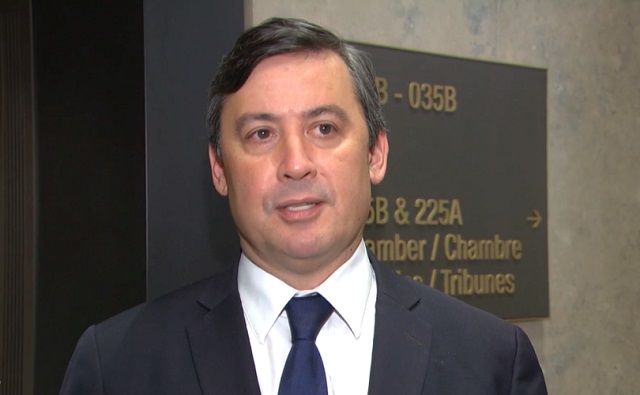Culture
Gerry Feehan takes us to North America’s Oldest European Settlement
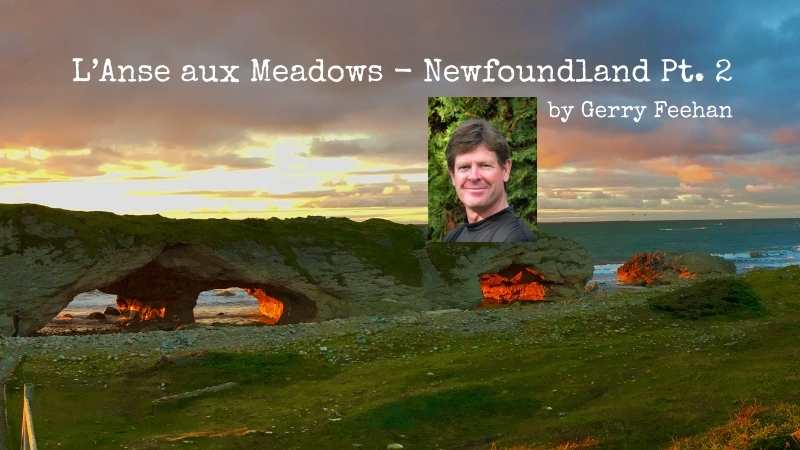
By Gerry Feehan
This is the second in the Newfoundland series. Scroll down to find Part 1, Gros Morne.
On a lonely highway in a tempest on Newfoundland’s remote Northern Peninsula, we finally spotted our first moose. Luckily, before moose met grill, the big bull stepped off the road into the ditch and I was able to keep the rig down the centerline, avoiding the frigid Gulf of St. Lawrence to our left and a frightfully deep fen to our right.
We had set out that morning from Gros Morne National Park, 350 km south ‘up’ the coast. The night before had been clear and 7 degrees. By early morning it was rain and 17. This was the muggy aftermath of Hurricane Irma, which long after devastating Key West, was now bringing high winds and warm rain to remote—and distinctly non-tropical—Newfoundland.

L’Anse aux Meadows is located on the remote west coast of Newfoundland.
We were bound for L’Anse aux Meadows, on the extreme tip of northwest Newfoundland where lie the remains of North America’s oldest European settlement. It was October so, although we arrived before 5 p.m., twilight was nigh as we settled in at the Viking RV Park. We were the only campers. The office was closed. In the morning I deposited cash in the “off-season/$25 per night” bucket by the abandoned office and drove the remaining few km to the National Historic Site.
One of the advantages to a late fall motorhome trip is that, with darkness extant by suppertime, it’s early to bed—and early to rise. (The healthy wealthy and wise part I won’t comment on.) So, uncharacteristically, we arrived at L’Anse aux Meadows first thing in the morning, just as the park gates were being unlocked.
“…Both are horrible!” said the Leif look-alike…”
Leif Ericsson, a Norse explorer, together with his small group of intrepid fellow Viking seafarers, landed here around 1000 AD. They strategically chose this spot near the Straight of Belle Isle, within sight of Labrador. They called the place Vinland, the land where wild grapes grow. Setting up a sturdy encampment of turf-walled buildings, they explored for hardwood lumber, iron ore and arable land.
From the visitor center we followed a Parks Canada interpreter down the winding boardwalk toward the sea. He showed us the faint remains of the original sod buildings: the Leader’s Hall, labourer’s quarters, a women’s workshop and the smelting hut where a charcoal kiln produced iron from bog ore. But the terrain was unwelcoming—as perhaps was the indigenous native population—and after only a decade or two, the Vikings abandoned the site, burning everything as they departed.
“….I die at you, she said laughing….”
The interpreter’s talk ended at the ruins and, with somber thoughts, we continued down the trail to where the National Park service has artfully reconstructed a series of replica sod huts by the cold sea. The Norse may have been fierce warriors but they couldn’t have been very tall—I had to stoop as we entered the longhouse. The room was dimly lit by a smoky peat fire. When our eyes adjusted to the low yellow light, we noticed a man and a woman clad in Viking attire seated by the comfortable fire. The man, a Leif Ericsson doppelganger, whittled a talisman while the young woman wove fabric on a traditional loom. They explained in detail how the first Viking explorers had lived, eaten, slept and toiled here 1000 years ago, eking out a meagre existence on this inhospitable shore by the frigid north Atlantic.

The replica sod huts are very realistic and come complete with period-costume Parks Canada personnel.
Newfoundlanders are the friendliest, most outgoing of people, so when I asked the young woman if she lived nearby, her Parks Canada persona evaporated like ‘tick fog’ and the talk immediately turned to the upcoming weekend, her two hard-earned days off and fall berry-picking. “I was born just over that side of the ‘arbour. My father ran trawler ‘til the fish ran out.” (In Newfoundland ‘fish’ means cod. Everything else, haddock, flounder, plaice, etc. is known by its usual name.) She winked and said, “Growing up, it was always cold in the house. In winter me mom would open the fridge to warm the place.”
I then inquired about the merits of partridgeberry vs. bakeapple jam. We had been looking for souvenir gifts and both berry varieties were available at the Dark Tickle Chocolate store just down the road. “Both are horrible!” said the Leif look-alike, unable to resist joining in. Our new lady-friend disagreed and told him so in no uncertain terms. “Oh me nerves, he’s got me drove.” Apparently, partridgeberry-picking was number one on her weekend agenda.
In an effort to segue the subject I asked whether the town of Quirpon or Great Brehat—each just down the coast—were worth a visit. She and Leif chuckled at my accent. “I die at you,” she said laughing. Nothing will more quickly label you a tourist in Newfoundland as the mispronunciation of local place names. Quirpon is ‘Car-poon.’ Great Brehat is pronounced ‘Great Bra’. Happily, I didn’t inquire about the town of Ferryland.
“Where are youse from?” our Viking-ess asked. “Alberta,” we replied. “Alberta,” she continued. “I’ve got a brother in Ft. McMurray.” (I can report that we didn’t meet a single Newfoundlander who did not have at least one family member working out west. But, no matter where a Newfie might live, a trip ‘home’ is always in the works. Famously, it is a 63-hour drive from Ft McMurray to the Rock.)
I tried to get her back on Viking track—but to no avail. All pretense of the 11th century Norsewoman was abandoned. She continued, talking about her husband, the small family garden, the incessant rain. “And there was himself last night,” she continued. “Luh, standing in a downpour, coat wide open, staring at lord knows what, sopped to the skin and stunned as me arse.” Then she politely adjusted her bonnet and resumed weaving.
CBC radio had gravely informed us that morning that the Doomsday Clock had been moved to two minutes before midnight. The world was closer to self-destruction than it had been at any time since the Cold War. I asked her if she was worried.
“Why, not a bit. After all, with the half-hour time change here on the Rock, us Newfies got ‘til 12:30.”
I love Newfoundland.

Arches Provincial Park glows at sunset.
Gerry Feehan, QC is an award-winning travel writer and photographer. He lives in Kimberley, BC.
Special thanks to Kennedy Wealth Management for supporting this series.
Business
The CBC prioritizes allyship over objectivity in Saskatchewan parental consent coverage – An empirical analysis
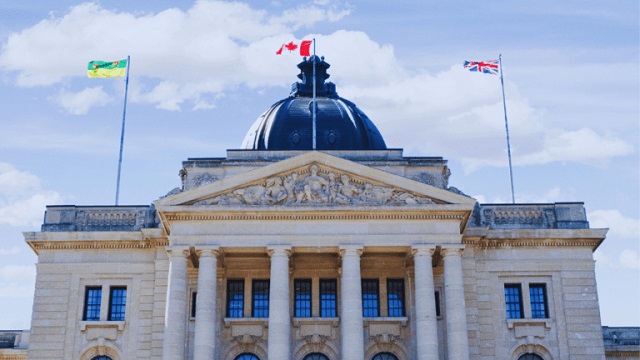
From the MacDonald Laurier Institute
By Dave Snow
Across 38 articles, the CBC quoted more than five times as many critics of Saskatchewan’s policy as supporters.
A common argument in favour of defunding the CBC is that its news content exhibits ideological bias. In particular, it has been subject to criticism that it is too progressive and Liberal-friendly, including for instance in its recent coverage of the Israel-Hamas war and Chinese interference in Canadian elections.
However, the assumption of the CBC’s progressive bias has rarely been tested empirically. To remedy this, I conducted an analysis of the CBC’s coverage of an issue that became a sustained national news story this past fall: Saskatchewan’s parental consent policy for children’s gender pronoun changes in schools.
The public debate around Saskatchewan’s pronoun policy involves complexity, competing perspectives, and evolving public opinion. It’s the sort of issue for which the role of the news media is presumably to establish and situate the facts, present the different points of view, and help Canadians work through the nuances. Yet, as my analysis shows, that’s not how the CBC’s reporting handled the issue.
Before describing the CBC’s coverage, it’s necessary to briefly describe the genesis and substance of the Saskatchewan government’s policy. In August, the government announced it would require parental consent for students under 16 to change their names or gender pronouns at school. The policy was challenged in court by the University of Regina Pride Centre for Sexuality and Gender Diversity (“UR Pride”), and on September 28, Justice Megaw of the Court of King’s Bench issued an injunction pausing the operation of the policy because of “the potentially irreparable harm and mental health difficulty” for students “unable to find expression for their gender identity.”
Later that day, Saskatchewan Premier Scott Moe announced that his government would respond to the injunction with a law invoking the notwithstanding clause. On October 20, that law, called the Parents’ Bill of Rights, was passed. The law stipulates that if a child under 16 requests that a “new gender-related preferred name or gender identity be used at school,” teachers and school employees “shall not use the new gender-related preferred name or gender identity unless consent is first obtained from the pupil’s parent or guardian.”
As a high-profile issue involving a clash of rights, Saskatchewan’s pronoun policy serves as an ideal case study to examine how the CBC covers contentious social policy disputes. To do so, I conducted a content analysis of all of the CBC’s written articles about Saskatchewan’s pronoun policy from August 22, 2023, the day the government announced its initial policy, to October 22, 2023, two days after the Parents’ Bill of Rights became law. During this period, the CBC published 38 news stories in which Saskatchewan’s policy featured prominently, six of which were written by journalists working for the Canadian Press.
Even before reading the articles, the headlines betrayed the direction of the CBC’s coverage: while no headline made an explicit argument against the policy, fourteen (37 percent) contained what I call “attributed criticism” of Saskatchewan’s policy—denunciation from someone other than the reporter. Examples include “Families of trans kids, activists say they’re angered, scared, disgusted by Sask.’s pronoun law” and “Sask. Opposition says pronoun and naming policy motivated by politics, transphobia.” By contrast, not one of the 38 articles contained attributed praise of the policy; the closest, “Sask. premier touts survey showing support for informing parents of name, pronoun changes in school,” referenced the Premier himself.
As these headlines show, CBC reporters relied heavily on outside sources to describe the policy’s purported impact. To determine who those sources were, I coded every person or organization quoted in the 38 articles into three categories: supporters of the government’s policy, critics of the policy, and sources who were neutral towards the policy (I excluded quotes from the government, politicians, and the judicial injunction itself). I also distinguished between those whose opinions were clearly sought by the CBC and those whom the CBC quoted from the public record.
Across 38 articles, the CBC quoted more than five times as many critics of Saskatchewan’s policy as supporters (81 critics, 15 supporters, and five neutral). Moreover, supporters were grouped into a small number of articles, with six of the 15 supporters quoted in a single story about competing public rallies. Only 16 percent of the total articles (six of 38) quoted at least one supporter of the policy, compared to 95 percent of articles (36 of 38) that quoted at least one critic of the government’s policy. And support was never presented independent of criticism: all six articles that included a quote from a supporter also included at least one quote from a critic.
The critics quoted by the CBC were also far more likely to be in a position of authority, while supporters were almost entirely laypeople. Of the 59 critics whose opinions were sought out by the CBC, 26 were what I classify as “experts”—lawyers and legal scholars, professors, school board presidents, health professionals, and LGBTQ organizations—and a further six were teachers. The focus on expertise was even higher from those quoted from the public record: of the 22 critics who were quoted from the public record, twenty (91 percent) were experts or organizations representing experts. By contrast, CBC reporters did not seek out a single “expert” to speak in favour of Saskatchewan’s policy. Of the 15 quotes from supporters that were sought by the CBC, 11 were from community members or protestors at rallies, while four were from the leaders of three small socially conservative interest groups.
The only expert the CBC quoted in defence of the rationale behind Saskatchewan’s policy (from the public record) was Dr. Erica Anderson, a clinical psychologist and a trans woman who presented an affidavit for the Saskatchewan government in court. The CBC article presented Dr. Anderson in a negative light, calling her a “vocal critic” of youth gender transition while failing to mention her decades of research and clinical experience. Most egregiously, the CBC article did not quote from Dr. Anderson’s affidavit even though the affidavit was the topic of the article (and even though much of it was quoted in the publicly available judicial injunction). Yet the same article included a quote from UR Pride’s legal counsel criticizing Dr. Anderson’s affidavit.
The selective presentation of content was even more apparent when it came to the CBC’s reporting on public opinion polls. Between August and October 2023, three Canadian polls were released regarding pronoun changes at schools. To understand the content of these polls, it is important to conceptualize of three policy options when it comes to informing parents when their child seeks to change gender pronouns at school. These fall along a continuum:
- Option A: Require that a child’s parents must be informed and require consent for any pronoun changes. This was the policy Saskatchewan ultimately chose.
- Option B: Require that parents be informed, but not require their consent.
- Option C: Neither inform parents nor require their consent.
On August 28, the Angus Reid Institute released a poll (though its data had been collected before Saskatchewan’s policy announcement). The poll showed that 50 percent of Saskatchewan residents believed parents should be informed of and provide consent for any changes (Option A); 36 percent of Saskatchewanians thought parents should be informed only (Option B); and only 10 percent said parents should be neither informed nor provide consent (Option C).
The day the poll was released, Saskatchewan’s Premier posted its results on X, highlighting that 86 percent of Saskatchewan residents support “some level of notification for parents when children want to change their gender identity in school.” This, of course, was a sleight-of-hand: Premier Moe’s statement elided the fact that only 50 percent of respondents thought parental consent should be required, which was his government’s policy.
Yet the CBC’s reporting engaged in a similar sleight-of-hand. In the CBC news story about this poll, its subhead read “Survey shows split on whether schools should require parental permission.” The CBC article framed the issue as permission vs. non-permission (Option A vs. Options B and C combined) where a 50-46 split indeed existed. However, none of the critics of Saskatchewan’s policy quoted by the CBC, in this article or in any other, recommended Option B. Of the 81 criticisms of Saskatchewan’s policy quoted across 38 CBC articles, not one said, “We think the Saskatchewan law goes too far, but we support a middle ground where informing parents should be a requirement.” By framing the survey results as “split,” but only giving voice to sub-position within one side of the split that had 10 percent support in Saskatchewan, the CBC overstated the extent to which critics of the law had public support for their position.
Even more concerning was how the CBC reported (or didn’t report) two subsequent polls. On October 12, polling firm Leger released survey results on gender identity and sexual orientation. Unlike the Angus Reid poll, this poll gave respondents only two options: “Schools should have to let the child’s parents know” about pronoun changes (combining Options A and B above), or “schools should not have to let the child’s parents know” (Option C). Although not as strong a divide as the Angus Reid poll, respondents still supported informing parents by an almost three-to-one margin, with 63 percent saying parents should be informed, 22 percent saying no, and the rest unsure.
As the Saskatchewan government had just invoked the notwithstanding clause to pass its law, the Leger survey also asked respondents “How much would you support or oppose your province using the ‘notwithstanding clause’ in the Constitution to ensure schools must inform parents if their child wishes to be identified by a different gender or have their gender pronoun changed?” Respondents supported the use of the clause by a roughly three-to-two margin: 46 percent supported the use of the clause, 31 percent opposed it, and 22 percent did not know.
A day before Leger released its poll, polling firm spark*insights had also released a poll commissioned on behalf of Egale Canada, an LGBTQ advocacy group that was involved in the litigation against Saskatchewan’s law. Unsurprisingly, this survey framed its questions rather differently. On the question of informing parents, spark*insights asked respondents whether a teacher should have “the discretion to not inform a parent if there is a credible risk to believe telling a parent could put the student at risk.” The inclusion of “credible risk” led to different results than the Leger results: 51 percent of respondents agreed that the teacher should have the discretion, while 49 percent said the teacher should have to inform the parent (the numbers for Saskatchewan residents were slightly more in favour of teacher discretion, 55 percent to 45 percent).
On the notwithstanding clause, the spark*insights survey prefaced its question by saying “A court has ruled that the policy will likely cause irreparable harm to affected children under the age of 16.” With the inclusion of the language of “irreparable harm,” only 27 percent of respondents agreed that Saskatchewan should “use legislative powers to immediately overrule the court and enact the law,” while 73 percent said the government “should allow the courts to review the policy before taking further action” (the numbers were 32 percent and 68 percent for Saskatchewan residents).
Of course, by inserting the language of “credible risk” and “irreparable harm,” the spark*insights survey is a textbook example of how not to frame unbiased polling questions. This is clear when the results are contrasted with the Leger poll released only a day later. Whereas Leger’s neutral framing showed a three-to-one ratio on informing vs. not informing parents, the spark*insights “credible risk” ratio was one-to-one; whereas Leger’s neutral framing showed a three-to-two ratio in favour of the notwithstanding clause, the spark*insights use of “irreparable harm” produced a nearly one-to-three ratio on the same topic.
Thus two surveys with differently-worded questions released a day apart produced very different results. How did CBC report on this disjuncture? Simple: it reported on the spark*insights poll, but not the Leger poll.
Whether deliberate or not, the omission of any mention of Leger’s poll was arguably the most damning aspect of the CBC’s coverage of Saskatchewan’s pronoun policy. Indeed, the CBC published 11 articles about Saskatchewan’s pronoun policy in the 10 days after Leger’s survey was released, none of which mentioned the poll. And it is not as if the poll flew under the national radar: it was the subject of a news story written by a Canadian Press reporter and published by CTV News, Global News, The Globe and Mail, and the Toronto Star. The CBC had even used a Canadian Press story about Saskatchewan’s pronoun policy by the same author a month earlier. Yet somehow, a poll that happened to complicate the CBC’s preferred narrative on Saskatchewan’s pronoun policy was simply not mentioned in the CBC reporting.
The above analysis lends empirical weight to what many have long suspected regarding the ideological tilt of the CBC’s news coverage. Perhaps even more troubling, however, is the lack of curiosity present in the CBC’s reporting on Saskatchewan’s pronoun policy. The 38 CBC articles were written by a combined 15 reporters, 13 of whom were CBC employees. Yet there was virtually no attempt to understand the justifications for a policy of informing parents about their children’s pronoun changes. The articles weren’t just one-sided; they were entirely predictable.
Perhaps this can explain why Canadians are increasingly shrugging their shoulders at the idea of a defunded CBC. If the CBC continues to push allyship over objectivity—and to do so in a way that leads to a less informed public—its $1.3 billion annual public subsidy will become increasingly harder to defend.
Dave Snow is an Associate Professor in Political Science at the University of Guelph.
armed forces
Maxime Bernier slams Trudeau gov’t for mandating tampons in male washrooms

From LifeSiteNews
Maxime Bernier accused ‘cultural marxists’ of desiring to turn as ‘many men as possible into non-binary, trans, gender-fluid, weak, effeminate sissies.’
People’s Party of Canada leader Maxime Bernier tore a page off a new federal government directive mandating feminine hygiene products in men’s bathrooms, calling it an “attack against masculinity,” and part of a “wider ideological battle” against men in an aim to turn them into “weaklings.”
“The Liberal decision to distribute tampons in men’s toilets everywhere, including on military bases, is just another step in the systematic attack against masculinity, and part of a wider ideological battle,” wrote Bernier on X (formerly Twitter) Thursday.
The Liberal decision to distribute tampons in men’s toilets everywhere, including on military bases, is just another step in the systematic attack against masculinity, and part of a wider ideological battle.
The woke far left want to destroy Western societies, which they see as… pic.twitter.com/eirnOtpfwA
— Maxime Bernier (@MaximeBernier) December 14, 2023
In his post, Bernier observed that the “far-left want to destroy Western societies, which they see as responsible for all evils in the world.”
“They’re not only busy undermining our institutions, our culture, our economy, our values, our history, our social cohesion, and the traditional family. They also want to completely destroy traditional gender identities and roles,” he noted.
Bernier has been a consistent vocal opponent of extreme gender-bending ideologies, saying there are only two “sexes” and that “common sense will prevail” in the gender debate. He has also been opposed to LGBT indoctrination in public schools. He has also called out the Conservative Party of Canada for not being vocal enough about these issues.
His commentary was brought on by a new federal mandate, which LifeSiteNews reported a few days ago, that forces all Canadian federal workplaces, including military bases, to provide what are termed “menstruation kits” in men’s bathrooms to promote “inclusivity.”
The new mandate comes into force today, December 15, as per an directive issued by Employment and Social Development Canada, which claims giving out free pads and tampons in men’s bathrooms enables “menstruating persons to take part fully in the workforce and society at large.”
Bernier noted that Canada is “throwing the baby out with the bathwater by letting the woke fanatics impose a new, unnatural and degenerate model,” when it comes to gender.
He argued that while it is “great that individuals nowadays are not coerced anymore into strictly conforming to traditional gender stereotypes,” the reality is women are “encouraged to not have children, treat all men like potential rapists, be ambitious and aggressive in their careers, and made to feel like failures if they prefer more traditional roles.”
Bernier: Cultural ‘Marxists’ want to turn men into ‘sissies” and ‘gender-fluid’ weaklings
Bernier noted how in today’s Canada, “traditionally feminine role models and identities” are being “normalized for men,” as traditional male roles are being frowned upon as “toxic” and thus somehow bad.
He observed that “human history” has shown that “strong men” have played the role of their society’s “providers and protectors,” but men today are being pushed into a corner.
“Today they [men] are not praised for their courage and selflessness, but denounced as exhibiting ‘toxic masculinity.’ It is no coincidence if the cultural Marxists have become obsessed with gender issues, and aim to brainwash and confuse our children with their sick gender ideology,” noted Bernier.
Bernier noted how the goal of the “cultural Marxists” is to turn as “many men as possible into non-binary, trans, gender-fluid, weak, effeminate sissies.”
“In short, in a world that is becoming increasingly unstable and dangerous, they want our society to disintegrate and become defenseless,” he said.
Over the past few years, there has been a noticeable push in western nations to actively promote gender ideology to young people, particularly in the United States and Canada.
The Liberal Federal government of Prime Minister Justin Trudeau is fully on board with the LGBT agenda. Recently, it pledged a whopping $100 million in funding last year for LGBT activist groups, with much of the money focused on youth and on-the-ground initiatives.
In 2017, Canada’s Senate passed what is termed the transgender rights bill. This bill adds “gender expression” and “gender identity” to Canada’s Human Rights Code and to the Criminal Code’s hate crime section.
Around the same time, Canada’s federal public servants were forced to take a mandatory feminist “gender equality” course or face unspecified consequences.
As for Bernier, he frequented many anti-COVID lockdown rallies across Canada throughout 2021 and 2022 when most provinces had in place strict COVID health rules. He was one of the few politicians to speak out against COVID mask and vaccine mandates from the start of the so-called pandemic, and one of the only to publicly announce that he never took the experimental vaccines.
-

 Jordan Peterson1 day ago
Jordan Peterson1 day agoJordan Peterson slams CBC for only interviewing pro-LGBT doctors about UK report on child ‘sex changes’
-

 Addictions1 day ago
Addictions1 day agoLiberal MP blasts Trudeau-backed ‘safe supply’ drug programs, linking them to ‘chaos’ in cities
-
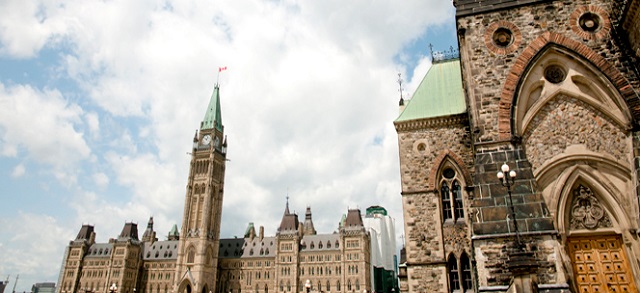
 Economy2 days ago
Economy2 days agoMassive deficits send debt interest charges soaring
-

 International2 days ago
International2 days agoBrussels NatCon conference will continue freely after court overturns police barricade
-
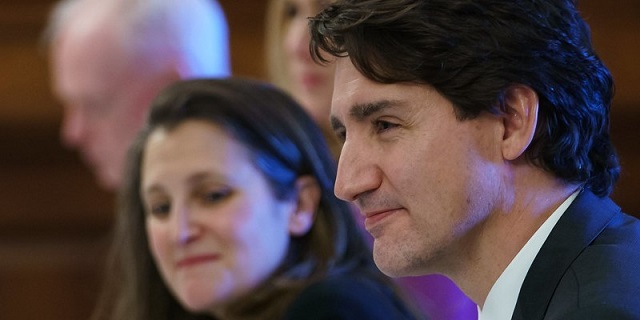
 Economy2 days ago
Economy2 days agoFederal budget’s scale of spending and debt reveal a government lacking self-control
-

 Agriculture1 day ago
Agriculture1 day agoBill C-282, now in the Senate, risks holding back other economic sectors and further burdening consumers
-

 International12 hours ago
International12 hours agoTelegram founder tells Tucker Carlson that US intel agents tried to spy on user messages
-

 Alberta23 hours ago
Alberta23 hours agoDanielle Smith warns arsonists who start wildfires in Alberta that they will be held accountable



